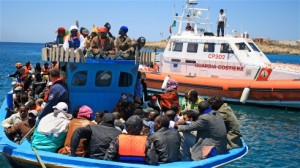
JOHANNESBURG, (IRIN) – The news that up to 850 lives were lost in the Mediterranean this past weekend as a result of five shipwrecks of boats carrying migrants has sparked a new round of calls for the European Union (EU) to take more responsibility for preventing deaths at sea.
This summer in the Mediterranean has seen an unprecedented number of migrants, refugees and asylum seekers boarding rickety smugglers’ boats in a desperate bid to reach European shores. Most of the movement has been concentrated in the central Mediterranean with the majority of departures from Libya, and Italy receiving most of the arrivals – about 120,000 so far in 2014, more than double the previous record of 54,000 (during 2011 at the height of the Arab Spring).
The number of deaths in the Mediterranean this year has also reached a new high of nearly 3,000, including the death toll from last weekend’s multiple tragedies, one of which appears to have been the result of smugglers deliberating ramming and sinking a boat carrying 500 migrants who refused to switch to a less seaworthy boat.
The figure would undoubtedly be higher if not for the Italian navy’s search-and-rescue operation, Mare Nostrum, launched in October 2013 following a shipwreck that claimed the lives of hundreds of asylum seekers a short distance from the Italian island of Lampedusa. Mare Nostrum has rescued 70,000 people since it began, but it comes with a US$11.5 million a month price tag that Italy is increasingly unwilling to shoulder alone.
The UN Refugee Agency (UNHCR) has backed Italy’s calls for more burden- sharing describing the “dramatic situation at Europe’s sea borders” as demanding “urgent and concerted European action, including strengthened search-and-rescue operations in the Mediterranean”.
Frontex Plus
Just a day after the release of that statement by UNHCR in late August, came an announcement by EU Home Affairs Commissioner Cecilia Malmstrom following a meeting with Italy’s interior minister that raised hopes member states were finally prepared to support Italy via an expanded mission of the EU’s border agency, Frontex.
The details of the mission, initially dubbed “Frontex Plus”, were vague. Malmstrom said only that it would “complement what Italy has been doing”, depending on the extent to which member states were willing to contribute and participate. Some commentators interpreted this to mean that Frontex would eventually take over from Mare Nostrum. However, migrants rights groups were quick to note the absence of the words “search-and-rescue” in Malmstrom’s announcement and to point out that Frontex lacks either the mandate or the capacity to fulfil that function.
It also soon emerged that Frontex Plus would operate only in Italian territorial waters while the majority of shipwrecks in which Mare Nostrum has intervened have occurred in international waters not far from the Libyan coast.
“It’ll be a classic Frontex border control operation,” said Stefan Kessler, senior policy and advocacy officer with Jesuit Refugee Service (JRS) Europe, who is also co-chair of the Frontex Consultative Forum on Fundamental Rights. “Search and rescue will only be a side effect, meaning that if in the context of those activities a boat in distress is spotted, then the national search-and-rescue authorities will be alerted.”
Ewa Moncure, a spokesperson for Frontex, explained that the new operation, now called Operation Triton, will combine two existing operations off the Italian coast that were due to expire at the end of September and will now be extended and merged starting from the end of November. “It would be closer to Italian shores and it won’t replace Mare Nostrum,” she confirmed.
“Search-and-rescue is always coordinated by national authorities,” she told IRIN, adding that Frontex vessels are required by maritime law to respond to boats in distress in their vicinity and that trained and equipped coast guards are on board. “But this is not the mandate of this agency.”
Michael Diedring, secretary-general of the European Council on Refugees and Exiles (ECRE), speculated that member states may not have come forward to pledge support for Frontex Plus at the levels Malmstrom had initially hoped for, “but having said that, it’s been long-standing policy of the EU, and particularly of the member states, that they want to focus on protecting borders not saving lives.”
Read more: Is the EU doing enough
Source IRIN


